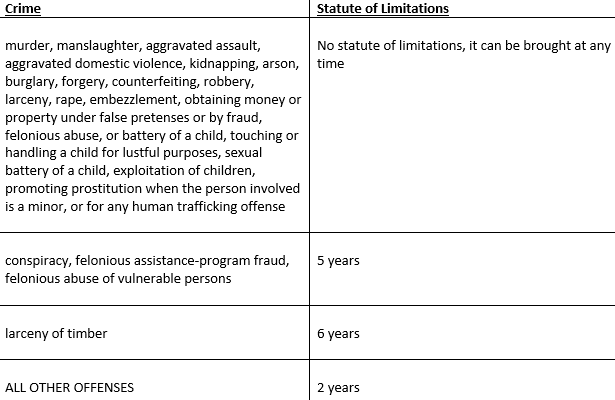Recently, we wrote a blog about the statute of limitations on medical malpractice cases. All civil cases have a statute of limitations, which is the certain time that a case has to be filed, otherwise, the case cannot go forward. But is there a statute of limitations on criminal cases? The short answer is yes, with a few exceptions.
Mississippi has a special statute, § 99-1-5, that explains that a prosecutor has a certain amount of time to initiate certain criminal cases against someone. There are two tricky parts to the statute, though. First, to figure out what the statute of limitations is, you have to look at what the underling crime is. Depending on the alleged crime, there may not even be a statute of limitations, which means that the prosecution can be commenced at any time. For other types of cases, the statute of limitations can range from two years to six years. To make things easier, here’s a helpful chart:

That bring us to the second part to consider: when is the prosecution officially initiated? If you look back at some of our previous posts about the right to a speedy trial, you’ll see that the constitutional right to a speedy trial starts when a person is charged, arrested, or indicted, whichever comes first. Here, it works in a similar way. From the moment that the alleged act occurs, the prosecution has to either secure a warrant, indictment, or affidavit, or arrest a person, within the right timeframe. If they do not, then as long as the alleged crime has no statute of limitation, then the case should be dismissed.
That being said, a major thing to remember is that if a warrant is issued early and the prosecution drags its feet on getting an indictment or taking the case to trial, then the statute of limitations will not apply, but the right to a speedy trial will most definitely continue to apply. The point is this: time is typically on a defendant’s side. The longer that the prosecution takes to take action, the greater the likelihood that a defendant will have their case dismissed.

